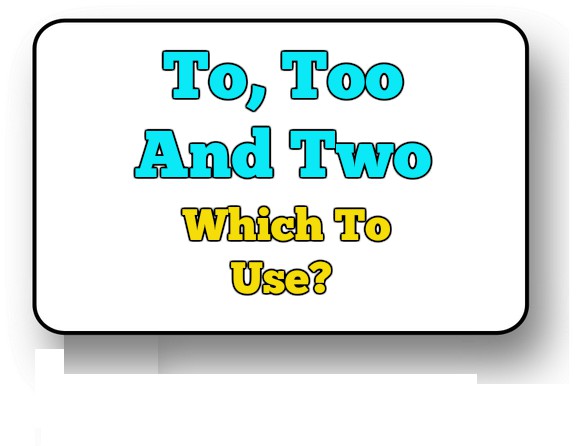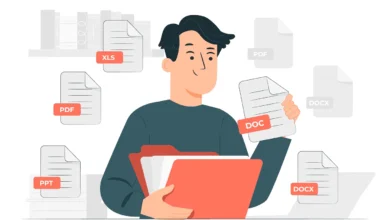How Do You Use To, Too, and Two?

Their utilization can be hard to comprehend. Welcome to the simplest method to figure out how to utilize, as well, and two! Look at the punctuation administers beneath, then, at that point test yourself with the test at the lower part of the page. You ought to likewise dominate the utilization of there, they are, and theirs! Here you will learn the difference between to and too.
Assuming you need to figure out how to differentiate between two, two, and two, take a gander at the definitions and models underneath. The contrast between two versus two, two versus two, and two versus two can totally change the importance of a sentence. Or then again more regrettable, it can make a sentence totally futile by not observing the principles of English punctuation. The reason for this site is to give a straightforward, clear clarification of how to appropriately utilize assuming, as well, and two.
Table of Contents
Too Versus Two: Are You Using Them Correctly?
Indeed, even individuals who grew up with these words in school can discover them befuddling. In the event that you question it, simply visit your number one online media website in the wake of perusing this article.
There is an opportunity you may see mistaken use, particularly the trade-off to and to. We will likely assist with guaranteeing that you keep away from such mistakes. Today we will take a gander at the distinction and right utilization of these words. Did you know, the OOTD full form?
Which Means Of Two Words
We’ll begin with the least complex of the three. The two words, composed with w, mean a number somewhere in the range of one and three. It can likewise be communicated mathematically as 2.
Illustration Of Two Of Every One Sentence:
- I went to the store to purchase two apples for my sister.
- Most local English speakers don’t battle with this word. Notwithstanding, some might in any case be involved by the following qualification.
- distinction somewhere in the range of two and two
- To signify “too,” “additionally,” or “other than.” It can likewise signify “exorbitant”.
Model
- My cousin additionally remained with us and watched the film. (Also)
- I wanted to work out, yet I rested past the point of no return. (Exorbitantly)
Words with a solitary o are a bit more confounded. It tends to be utilized with an action word, for example, “to rest” or “to eat.” It can likewise be utilized as a relational word signifying “towards.”
Model
- We have purchased another couch so that there is space for the visitors to sit. (infinitive)
- I will go to the shop after the game is finished. (relational word)
As a rule, you can simply recall that you need the more extended word also when you need to communicate the expansion or abundance of something.
To
Can be utilized as a relational word of development or bearing. It demonstrates the spot you reach because of strolling.
- I’ll take a taxi to the air terminal.
- We’re going to the arena around evening time.
- The train to Montreal leaves quickly.
- What is the quickest way to the seashore?
- From X to Y: alludes to the endpoint of a time span.
- The office stays open from 8.30 am to 6.30 pm.
- She works all day.
Note: When we don’t have start time, we use till.
- Today I figure I will work just till 5 o’clock.
- It distinguishes the individual or thing influenced or got
- I gave a gift to my companion Paulina.
- Can you give my keys to Jack?
- They weren’t unreasonably acceptable.
- We sat tight for the traffic signal to change from red to green.
- He tore the letter into pieces.
- Note that when two action words happen together, the subsequent action word is in the infinitive structure (with the exception of modular action words and to be).
- Next year I need to go through a half year in Europe.
- He needs to concentrate more.
For support can be utilized before descriptors or qualifiers signifying ‘much’ or ‘more than…’
- This dress is too large for me. (additionally + descriptive word)
- He was driving too quick so the police fined him. (additionally + qualifier)
- Can be utilized as a verb modifier signifying ‘additionally’ or ‘what’s more
- She has additionally been to Switzerland. (= too)
- I was so drained last evening as was my companion. (= too)
- Too much and a lot of alluding to an inordinate measure of something.
- without a doubt (+ uncountable thing)
- without a doubt (+ plural thing)
- Sorry, I can’t go. I need to work a ton.
- There were such a large number of individuals in the room.
- I have eaten excessively. (= eating excessively)
See our notes about Plenty versus Parcels versus Enough
Two
Utilized uniquely as a number. two = 2
Model:
- There are two vehicles in the vehicle left.
- I can communicate in two dialects, English and Spanish.
Two – To – To – English Grammar Rules
The distinction between two, two, and two is regularly confounded in English, in some cases even to local speakers. Why? Since they are homophones, words that sound very similar however have various spellings and implications. While they are all strong the same, it is in this setting that you can comprehend its significance.
Model:
- It was past the point where it is possible to purchase two containers of water.
- Don’t be past the point of no return on the grounds that there are two others who need to utilize the web.
Sentences utilizing the combination the additionally … from thus following the sentences with … that.
- he is exceptionally old. He can’t work.
- We can likewise interface these two sentences utilizing the structures…to and so…that.
- Words are qualifiers that can change the word a great deal.
- He’s too old to even consider working.
- He is old to such an extent that he can’t work.




